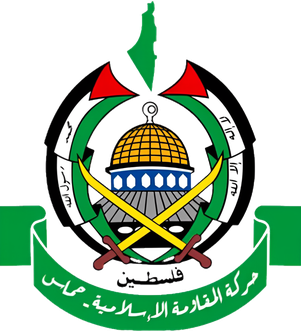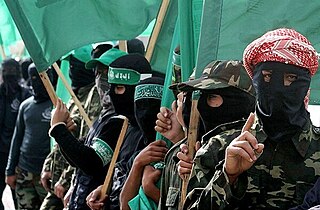Related Research Articles

Hamas, an acronym of its official name, the Islamic Resistance Movement, is a Palestinian Sunni Islamist political and military organization governing the Gaza Strip of the Israeli-occupied Palestinian territories. Headquartered in Gaza City, it has a presence in the West Bank, the larger of the two Palestinian territories, in which its secular rival Fatah exercises control.

Sderot is a western Negev city and former development town in the Southern District of Israel. In 2021, it had a population of 30,553.

Jewish Voice for Peace is an anti-Zionist left-wing Jewish activist organization in the United States that supports the Boycott, Divestment and Sanctions campaign against Israel.

Palestinian political violence, including Palestinian terrorism, refers to actions carried out with the intent to achieve political objectives that can involve the use of force, some of which are considered acts of terror, by Palestinians; often in the context of the Israeli-Palestinian conflict. Common objectives of political violence by Palestinian nationalists include self-determination in and sovereignty over Palestine, or the "liberation of Palestine" and recognition of a Palestinian state, either in place of both Israel and the Palestinian territories, or solely in the Palestinian territories. Several seek the destruction of the State of Israel. More limited goals include the release of Palestinian prisoners or the Palestinian right of return. Other motivations include personal grievances, trauma or revenge.

Independent Jewish Voices Canada (IJV) is an organization that describes itself as representing Canadian Jews who have a strong commitment to social justice and universal human rights. The organization was founded in 2008 as a result of a national conference called on behalf of the Alliance of Concerned Jewish Canadians.

Nahal Oz is a kibbutz in southern Israel. Located in the northwestern part of the Negev desert close to the border with the Gaza Strip and near the development towns of Sderot and Netivot, it is under the jurisdiction of Sha'ar HaNegev Regional Council. In 2021, it had a population of 471.
This is the Timeline of the Israeli–Palestinian conflict in 2007.

In 2008, Israel sought to halt the rocket and mortar fire from Gaza that killed four Israeli civilians that year and caused widespread trauma and disruption of life in Israeli towns and villages close to the Gaza border. In addition, Israel insisted that any deal include an end to Hamas's military buildup in Gaza, and movement toward the release of Corporal Gilad Shalit. Hamas wanted an end to the frequent Israeli military strikes and incursions into Gaza, and an easing of the economic blockade that Israel has imposed since Hamas took over the area in 2007.

The Gaza–Israel conflict is a localized part of the Israeli–Palestinian conflict. The conflict originated with the Israeli withdrawal from Gaza in 2005. Following the withdrawal, Hamas won the 2006 Palestinian legislative election, and a civil war between Hamas and Fatah in 2007 culminated in Hamas gaining control over Gaza. In response to Hamas's takeover, Egypt and Israel imposed an extensive blockade of the Gaza Strip that devastated Gaza's economy. International rights groups have decried the blockade as a form of collective punishment, while Israel defended it as necessary to prevent weapons and dual-use goods from entering the territory. Since 2006, Hamas and Israel have fought five wars, the most recent in 2023.

The Gaza War, also known as Operation Cast Lead, also known in the Muslim world as the Gaza Massacre, and referred to as the Battle of al-Furqan by Hamas, was a three-week armed conflict between Gaza Strip Palestinian paramilitary groups and the Israel Defense Forces (IDF) that began on 27 December 2008 and ended on 18 January 2009 with a unilateral ceasefire. The conflict resulted in 1,166–1,417 Palestinian and 13 Israeli deaths.

Since 2001, Palestinian militants have launched tens of thousands of rocket and mortar attacks on Israel from the Gaza Strip as part of the continuing Arab–Israeli conflict. The attacks, widely condemned for targeting civilians, have been described as terrorism by the United Nations, the European Union, and Israeli officials, and are defined as war crimes by human rights groups Amnesty International and Human Rights Watch. The international community considers indiscriminate attacks on civilian targets to be illegal under international law. Palestinian militants say rocket attacks are a response to Israel's block of Gaza, but the Palestinian Authority has condemned them and says rocket attacks undermine peace.

The Mujahideen Shura Council in the Environs of Jerusalem or simply the Mujahideen Shura Council is an armed Salafi jihadist group linked to al-Qaeda that is active in Egypt's Sinai Peninsula and in the Gaza Strip. The group was formed in 2011 or 2012 by Salafist Islamist Hisham Al-Saedni to coordinate the activities of the Salafi jihadist groups operating in Gaza even before the Egyptian Revolution of 2011 and has carried out attacks against civilians in Israel. The group describes violence against Jews as a religious obligation that brings its perpetrators closer to God. Al-Saedni, who was the leader of the group and also of Jahafil Al-Tawhid Wal-Jihad fi Filastin, was killed in an Israeli airstrike in Gaza on 14 October 2012. The group is subordinated with Al-Qaeda in Sinai Peninsula as of August 2012.

Avner Faingulernt is an Israeli independent filmmaker. He is Professor and the dean of the Faculty of Arts, Kibbutzim College in Tel Aviv. He was chair of the School of Audio & Visual Arts, Sapir Academic College, founder of Cinema South Festival in Sderot, chief editor of the annual "Cinema South Notebooks" and "Cinema South The Curator Book". Faingulernt was also a visiting professor at Columbia University in New York, the University of Haifa, the Film and TV School of the Academy of Performing Arts in Prague and at Filmakademie Baden Württemberg. He is an educator and a peace activist.
The Gaza Youth Committee is a peace activism organization based in the Gaza Strip. It was founded in 2010 by Rami Aman. As of 2019, the group had more than 200 members.
Nomika Zion is an Israeli social and political activist best known for co-founding kibbutz Migvan and peace organization Other Voice.
References
- 1 2 3 4 "Other Voice". www.annalindhfoundation.org. Retrieved 2023-11-17.
- 1 2 3 4 5 6 7 8 9 Kloosterman, Karin (2009-01-07). "Finding the Other Voice in Gaza and Sderot". ISRAEL21c. Retrieved 2023-11-17.
- ↑ "Other Voice". Alliance for Middle East Peace. Retrieved 2023-11-17.
- 1 2 3 4 Brand, Tomer (2008-08-11). "Blogging for peace". Ynetnews. Retrieved 2023-11-17.
- 1 2 3 Prince-Gibson, Eetta (2014-07-30). "Against the grain: Israeli group calls for dialogue with Gaza". Al-Monitor. Retrieved 2023-11-17.
- 1 2 Yagna, Yanir (February 14, 2011). "Sderot Mayor Heeds Right-wing Call to Boycott Sapir College Conference on Gaza Strip Crisis". Haaretz. Retrieved 2023-11-17.
- 1 2 Rose, Alex (July 21, 2023). "REACHING OUT BEYOND THE GAZA WALLS: AN INTERVIEW WITH RONI KEIDAR". Canadian Friends of Peace Now. Retrieved November 17, 2023.